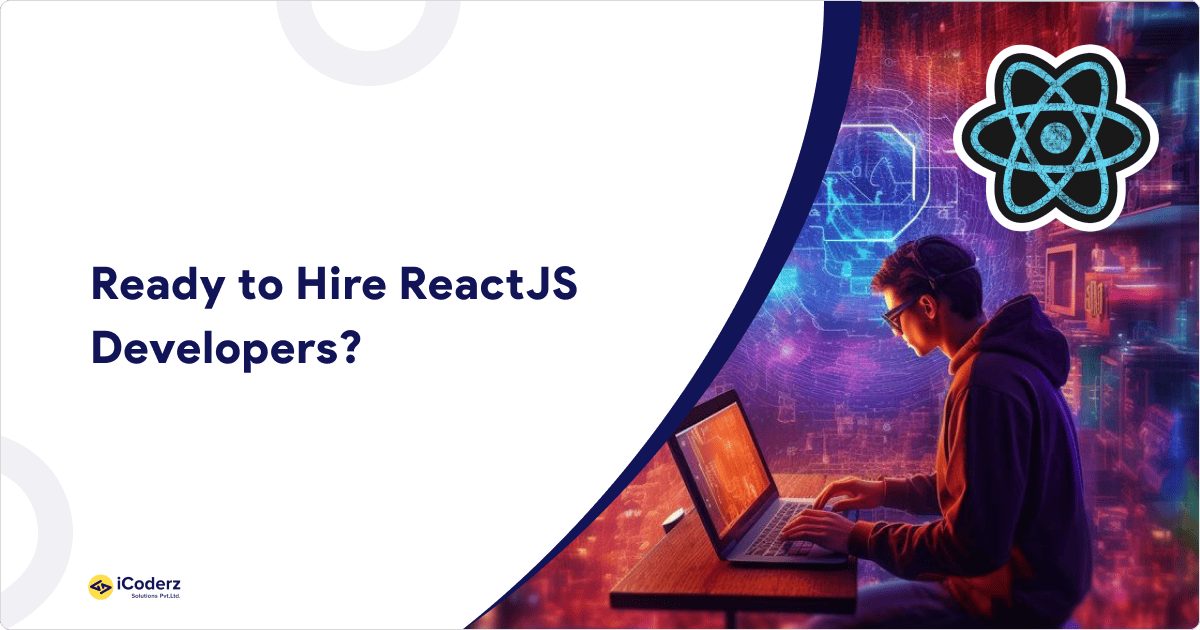React.js is one of the most popular frameworks for building modern web applications. It powers over 11 million websites worldwide. Its component-based architecture, virtual DOM, and efficient rendering make it a top choice for developers and businesses looking to create scalable, fast, and user-friendly applications.
However, the success of any React.js project depends on hiring the right talent. Knowing how to hire ReactJS developers with strong technical expertise and problem-solving skills ensures your applications perform seamlessly, deliver intuitive user experiences, and remain maintainable over time.
Whether you need in-house talent, freelancers, or remote developers, understanding the key skills, evaluation strategies, and best practices is essential.
React.js powers some of the most popular web platforms today due to its speed and flexibility. Check out the key features of React.js to understand why it’s such a developer favourite.
This blog provides a comprehensive ReactJS developer checklist, highlights critical skills, and shares actionable tips on how to hire React.js developers for your project.
Understanding the Role of a ReactJS Developer
A ReactJS developer is a front-end expert who builds fast, responsive, and interactive user interfaces. They do more than write code—they ensure designs work well, apps run smoothly, and the code is clean and easy to maintain. Knowing this role helps you hire the right developer for your project.
Core Responsibilities
- Front-End Expertise: React.js developers transform designs into interactive web pages and components, ensuring a smooth user experience.
- UI/UX Integration: They work closely with designers to implement intuitive interfaces that engage users effectively.
- Performance Optimisation: React developers minimise load times, optimise rendering, and manage efficient state handling.
- Component-Based Development: Using React’s modular approach, they build reusable components that reduce redundancy and simplify maintenance.
- Collaboration: They work with back-end developers, designers, and project managers to ensure smooth development cycles and feature integration.
Common Use Cases
React.js is versatile and widely adopted across industries. Some of the most common applications include:
- Single-Page Applications (SPAs): Websites that load a single HTML page and dynamically update content, improving speed and responsiveness.
- Dashboards: Interactive analytics dashboards for finance, operations, or marketing teams.
- E-Commerce Platforms: Online stores with fast-loading product pages, dynamic filters, and seamless checkout experiences.
- Social Media Platforms: Real-time updates, interactive feeds, and responsive interfaces.
- Progressive Web Apps (PWAs): Applications that provide native app-like experiences directly in the browser.
Understanding the role clearly prevents misaligned expectations, project delays, and additional costs. You can explore mobile application development to see how React.js integrates into broader projects.
Why Understanding the Role Matters
Hiring a React.js developer without clarity on their responsibilities can lead to misaligned expectations, project delays, and additional costs. By understanding the technical and collaborative aspects of the role, you can ensure that the professional you hire brings measurable value to your project.
From Single-Page Applications (SPAs) to e-commerce, React’s versatility drives innovation across industries. You can explore popular websites built with React.js to see real-world examples.
What Skills Should a React.js Developer Have?
Finding the right React.js developer requires more than just scanning resumes. You need to assess a combination of technical expertise, familiarity with modern tools, and soft skills that ensure smooth collaboration. Here’s a detailed breakdown of the essential skills to check before you hire React.js developers.
A. Core Technical Skills
A React.js developer should have a strong foundation in web development fundamentals:
- JavaScript (ES6+): Modern JavaScript features like arrow functions, destructuring, async/await, and promises are crucial.
- HTML5 & CSS3: Properly structuring web pages and styling components is essential for responsive and visually appealing designs.
- DOM Manipulation: Understanding how the Document Object Model works helps optimise performance and debug issues efficiently.
B. React.js Expertise
Deep knowledge of React.js is the most critical aspect:
- Components & JSX: Ability to build reusable, modular components using JSX syntax.
- Hooks: Mastery of React Hooks (useState, useEffect, useMemo, etc.) for state management and lifecycle handling.
- State Management: Familiarity with Redux, Context API, or other state management solutions to manage complex application states.
- Component Lifecycle: Understanding lifecycle methods and how components update, mount, and unmount.
- Performance Optimisation: Techniques like memoisation, lazy loading, and code splitting to improve app efficiency.
React’s efficiency is one of the main reasons businesses adopt it. Learn more about the benefits of React.js development and how it helps companies scale faster.
C. Additional Tools & Libraries
Modern React.js projects often require knowledge of complementary tools:
- TypeScript: Adds type safety and reduces runtime errors in large projects.
- Next.js: Framework for server-side rendering and optimized React applications.
- React Native Basics: Useful if you plan to scale to mobile applications.
- CSS-in-JS Libraries: Styled-components or Emotion for dynamic styling.
D. Testing & Debugging Skills
Quality assurance is a crucial part of a React.js developer’s workflow:
- Unit Testing: Jest or Enzyme for testing individual components.
- End-to-End Testing: Cypress or Selenium for complete application testing.
- Debugging: Strong problem-solving and debugging skills to resolve issues efficiently.
E. Version Control & Collaboration
Collaboration is key in modern software development:
- Git & GitHub: Ability to manage code versions, resolve conflicts, and contribute to shared repositories.
- Agile Methodologies: Experience working in Scrum or Kanban environments, handling sprints, and participating in daily standups.
F. Soft Skills
Technical skills alone aren’t enough. A great React.js developer should also have:
- Problem-Solving: Analytical thinking to find efficient solutions.
- Communication: Clear communication for team collaboration and client interactions.
- Teamwork: Ability to work harmoniously with designers, back-end developers, and project managers.
- Adaptability: Willingness to learn new tools, frameworks, or updates in React.js.
How Do You Interview React.js Developers?
Evaluating a React.js developer goes beyond reviewing a resume or portfolio. A structured interview and technical assessment process ensures you identify technically proficient candidates and a good cultural fit for your team.
A. Screening Questions
Start with foundational questions to gauge their understanding of React.js and JavaScript:
- React Fundamentals: Ask about JSX, component types, props vs. state, hooks, and lifecycle methods.
- JavaScript Logic: Evaluate knowledge of ES6+ features, asynchronous programming, closures, and array methods.
- Problem-Solving Approach: Present hypothetical scenarios to understand their analytical thinking.
B. Coding Challenges
Practical coding exercises help test real-world skills:
- Build a Component: Ask them to create a reusable React component with dynamic props.
- Debugging Task: Present a small snippet of broken code and see how efficiently they identify and fix issues.
- State Management Exercise: Test their ability to manage state using Redux, Context API, or hooks.
For consistent results, consider partnering with a dedicated React.js development team..
C. System Design & Architecture Questions
For mid-to-senior level developers, assessing system-level understanding is essential:
- Scalability: How would they design an app to handle high traffic or large datasets?
- Performance Optimisation: Techniques for lazy loading, memoisation, and code splitting.
- Component Architecture: Approaches for reusable, modular, and maintainable code.
D. Cultural Fit & Communication
Technical skills alone aren’t enough. Evaluate how well they integrate with your team:
- Collaboration: Ask about experiences working with designers, back-end developers, or cross-functional teams.
- Adaptability: Are they open to learning new tools or frameworks when required?
- Communication Skills: Can they clearly explain complex concepts and code decisions?
E. Remote Team Considerations
If you’re hiring remote React.js devs, include questions on:
- Time Management: Ability to meet deadlines independently.
- Self-Motivation: Handling tasks with minimal supervision.
- Remote Collaboration Tools: Familiarity with Git, Jira, Slack, or Trello.
Explore back-end development services to see how React.js integrates with robust server-side solutions.
What Red Flags Should You Avoid When Hiring?
When hiring React.js developers, it’s essential to identify top talent and recognise potential warning signs that a candidate may not be the right fit. These red flags can save your project from costly mistakes, delays, and subpar code quality.
A. Exaggerated Experience Without Proof
- Candidates may claim expertise in advanced React.js features, libraries, or tools without providing tangible evidence such as portfolio projects, GitHub repositories, or references.
- Always verify experience through code samples or real project demonstrations to avoid hiring based solely on claims.
B. Weak Foundation in Core JavaScript
- React.js is built on JavaScript; a serious concern is a poor understanding of ES6+ features, closures, promises, and asynchronous programming.
- Even if a developer is familiar with React, lacking core JavaScript skills can result in inefficient, error-prone applications.
C. Inability to Explain Code Logic Clearly
- A strong React.js developer should articulate how they implemented a solution and why they chose a particular approach.
- Struggling to explain decisions often indicates limited experience or insufficient understanding of scalable, maintainable solutions.
D. Resistance to Learning and Adapting
- Web development and React.js evolve rapidly, with new libraries, hooks, and performance optimisation techniques emerging frequently.
- Candidates who show reluctance to learn or adapt may struggle to keep your project modern and efficient.
E. Poor Communication or Collaboration Skills
- Difficulty expressing ideas, avoiding code reviews, or failing to document work clearly can create friction in team environments.
- Especially in remote setups, weak communication skills can lead to misunderstandings, project delays, and lower productivity.
F. Focus on Theory Over Practical Application
- Candidates relying heavily on academic knowledge but not demonstrating real-world problem-solving may not be suitable for production-level projects.
- Look for evidence of applied skills through portfolio projects, open-source contributions, or practical coding challenges.
By staying vigilant about these red flags, businesses can avoid hiring mismatches and focus on the best React developers who bring technical expertise and practical experience.
What Are the Best Practices for Hiring React.js Developers?
Hiring the right React.js developer requires a strategic approach that balances technical evaluation, team compatibility, and project goals.
Following React.js Recruitment tips can help streamline your hiring process and ensure you select developers with the right technical and soft skills mix.
A. Decide on the Type of Developer
- In-House Developers: Ideal for long-term projects where constant collaboration and deep integration with the team are required.
- Freelancers: Suitable for short-term tasks or specialized work without long-term commitment.
- Remote Teams: Cost-effective for scaling development capacity, especially if your project requires expertise unavailable locally.
B. Use Trusted Hiring Platforms
- Find qualified developers by leveraging reputable platforms such as Upwork, LinkedIn, Toptal, or Stack Overflow Talent.
- These platforms provide reviews, portfolios, and skill verification, helping reduce hiring risks.
C. Start with a Paid Trial Project
- Before committing to a long-term engagement, assign a small, well-defined project.
- This allows you to assess technical skills, problem-solving ability, and communication style in a real-world scenario.
D. Provide Clear Project Requirements
- Well-documented requirements, wireframes, and feature lists ensure the developer understands expectations.
- Clear communication prevents misunderstandings and helps developers deliver efficient, high-quality solutions.
E. Consider Time Zone and Availability
- If hiring remote React.js developers, ensure overlapping working hours for collaboration and meetings.
- Evaluate their availability for ongoing support, updates, and future project scaling.
F. Evaluate Long-Term Collaboration Potential
- Assess whether the candidate will learn, adapt, and grow with your project.
- Long-term developers often provide better consistency, maintainability, and project continuity than short-term hires.
G. Maintain a Structured Hiring Process
- To make informed decisions, combine portfolio review, technical assessments, coding challenges, and interviews.
- Document evaluation criteria and feedback to improve hiring consistency over time.
If you’re still deciding between technologies, explore React.js vs React Native to make an informed choice for your project.
Conclusion: How to Hire ReactJS Developers and Why It Matters
Hiring the right ReactJS developer is key to the success of your web or app projects. Evaluating technical skills—like JavaScript, React.js, and modern tools—along with soft skills such as communication and problem-solving, ensures high-quality results.
Reviewing portfolios, conducting coding challenges, and assessing cultural fit help identify the best React developers and avoid costly hiring mistakes. Whether you need in-house, freelance, or remote talent, understanding how to hire React.js developers effectively will guide you toward the right choice for your project. Hire React.js developers with iCoderz, the best company for building scalable, high-performing, interactive applications. We deliver solutions that meet your business goals efficiently and reliably. For inquiries or to get started, contact us today.
Hire Expert React.js Developers Today
Build scalable, high-performance applications with vetted React.js talent. Let our team connect you with the right developers for your next project.




